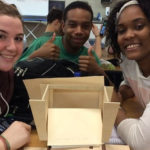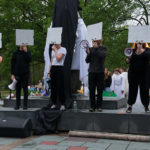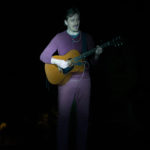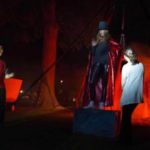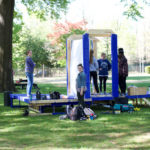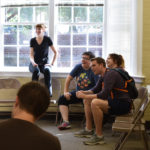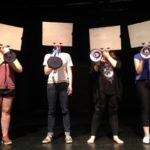On April 11, 2017, the Theatre Department—in collaboration with other campus and Memphis entities—performed an episodic Bible play, after the manner of medieval cycle dramas. In addition to involving selected Search and Life classes, we invited Memphis sub-communities to prepare episodes of their own to incorporate in the full production. The performance took place in individual episodes staged in different locations on campus, and involved a pageant-wagon procession.
About the Rhodes Cycle:
An episodic, collaborative, performative, chaotic, super-nuts staging of the bible, involving Rhodes College students, Memphis theatre companies, University of Memphis MFA candidates, public and private Memphis high schools, and the kitchen sink.
We don’t know what’s going to happen. By the high middle ages, communities in Western Europe were staging bible plays, annually. Episodes were doled out to trade guilds, which developed and rehearsed their episodes apart from the other guilds, only performing together on festival day. Wagon stages were common, and often complex. We’ve got guilds, from a Latin class to bi-lingual performers to high schoolers to aerialists. We’ve also got wagons.
In days before printed books, almost no one knew the Bible as a book to be read. Instead, folks knew the Bible as a narrative to be played.
Here in the early twenty-first century, we’ve gathered more than ten college and Memphis community groups to stage Bible episodes—from before creation to judgment—on custom-built wagon stages up and down the college’s remarkably cathedral-like ‘oak alley’.
We’re playing the bible. Come play it with us.
This proposed project aims at asserting creative practice as genuinely pedagogical activity. Among other things, the proposal to attach the Faculty Innovation Fellows to this project hopes to enhance the standing of creative activity, and to demonstrate—in practice—how it serves pedagogical purposes. The proposal speaks directly to the Mellon Foundation’s interest in innovative pedagogy, insofar as the project will demonstrate what creative work does that is not, generally, recognized as pedagogy. The project also demonstrates just what a community of practice can be and can do.
To contribute to the development of this performance, the department plans to bring to campus artists whose practice is invested in innovative methods of imagining, inventing, and realizing performance pieces. These visiting artists will engage students in workshop sessions designed to pull down the conventional concepts of theatrical performance that they bring from high school and to introduce students to practices through which to create more authentically original, challenging, uneasy, and sharp expressions. Although the project will realize some traditional pedagogical goals—in the form of illuminating the mechanisms of medieval performance—the primary pedagogical value of such work lies in the body more than in the head. Some things—like riding a bike—involve an education that is embedded and manifest, essentially, in the body’s experience of itself and its environment.
The Faculty Innovation Fellows will be a significant extension of this project. Visiting artists will conduct private workshop sessions with Faculty Innovation Fellows, to provide fellows with experience of creative practice, without which they cannot assess the value of creative practice. These sessions will demonstrate what active, physical creativity contributes to learning, teaching, research, and community, and will offer innovative apparati to fellows for their own pedagogy.
How this project embodies the specific interests of the Mellon Innovation Fellowship:
- This project aims to facilitate sustained, creative cooperation between Rhodes students, faculty, and Memphis community members. The curricular conceit involves a messy and intimate and (for some) unusual confrontation of a text that is fundamental to Western culture.
- This project emerges from my research interests in the ways religion and theatre overlap in the distinct phenomenon of physical practice.
- This project offers faculty fellows types of practice with which they are unfamiliar, and which the campus, generally, undervalues as pedagogical tools. The project also looks to forge across boundaries between faculty and students, and between Rhodes groups and Memphis groups, the kinds of new relationships that are among performance work’s peculiar features. Creative endeavors uniquely shape communities of practice.
- Cohorts of students—emerging from formal courses and otherwise—will be engaged in developing episodes for performance. A select few students may be funded with fellowships to provide directorial, design, and technical support across groups.
- The project’s outcomes include an affirmation-in-undertaking of the value of creative activity to the liberal arts premise. More practically, the project will show faculty how creative activity teaches. An even more concrete outcome could be the development by faculty fellows, themselves, of an episode to include in the project’s Spring, 2017, performance. This kind of creative risk-taking can’t be compelled with much success, but Professor Mason will urge (and help) faculty fellows to prepare, collectively, their own episode for performance.

David Mason
Associate Professor
Chair of Theatre
Director of Asian Studies
Dr. Mason's research focuses on the overlap of religion and theatre.


